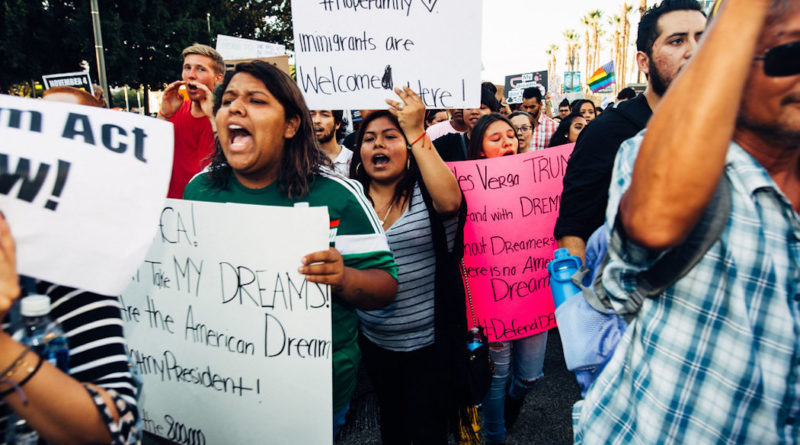OPINION: Rescinding DACA Protects Racism, Not America
Mary McLoughlin
Opinion Editor
The Supreme Court will decide if DACA – a popular program that protects the children of undocumented immigrants from deportation – can continue. Cover photo courtesy of Flickr
On Nov. 12, the Supreme Court heard arguments about the legality of DACA. DACA, which stands for Deferred Action for Childhood Arrivals, is a 2012 Obama program that prevents the deportation of individuals who were brought to the U.S. as children and pass a screening process. Since 2017, no new DACA applicants have been accepted, but those who already received DACA status have been allowed to renew their status. The Supreme Court will soon decide if DACA can continue.
The same day that the Supreme Court was hearing arguments about the legality of DACA, Trump tweeted that “Many of the people in DACA, no longer very young, are far from ‘angels.’ Some are very tough, hardened criminals.”
PolitiFact argues that since “Federal guidelines prohibit immigrants convicted of felonies, significant or numerous misdemeanors from enjoying DACA protection,” Trump’s claim that DACA recipients are criminals is false.
Trump received a significant amount of pushback for his tweet, which was perceived by many as being unnecessarily divisive. While Trump being divisive about immigration is on-brand for him, what’s interesting about DACA is that most Americans agree on it: DACA is good.
According to a 2018 poll conducted by Politico, two-thirds of Americans believe that its “extremely important” for Congress to renew DACA. Similarly, a 2018 CBS news poll found that 70% of Americans favor allowing DACA recipients to stay in the U.S. And, according to a Gallup poll, 83% of Americans approve of allowing DACA recipients to become citizens.
Support for DACA is wide reaching because, in my opinion, DACA is almost too moderate to be controversial.Though it was passed by a Democratic president, DACA is actually pretty conservative as far as immigration policies go. As a solution to problems within our immigration system, DACA accomplishes the bare minimum.
First, DACA is highly selective—only individuals under 31 who came to the U.S. when they were younger than 16 can apply for DACA. DACA doesn’t excuse illegal immigration, it just operates under the premise that children should not be punished for what their parents do. A phrase often used to talk about DACA recipients is that, “they came here through no fault of their own,” a rhetorical strategy which insists that there are other bad immigrants who should be blamed. That’s not a radical stance.
Second, DACA has a pretty intensive screening process—recipients must have graduated from high school, be currently in school, or have been honorably discharged from the armed forces, and without a criminal record. In this sense, the DACA program only protects “good immigrants.” DACA recipients speak English, they grew up “American,” and they have an education.
Third, DACA comes with considerable restrictions—DACA recipients need permission to travel outside the country and must biannually share personal information, which poses certain risks to themselves and undocumented family members. This level of surveillance limits the freedom of DACA recipients. They must regularly sacrifice any right to privacy to maintain their status, and they know that their status could be revoked at any time.
See also- In Defense Of Whom? The Racism Behind Ohio’s Self-Defense Laws
And, most significantly, DACA is not a permanent solution—DACA recipients must reapply every two years, DACA does not provide a legal status, and DACA provides no pathway to citizenship. DACA does not provide a place for immigrants within the nation; it simply prevents them from being deported.
So why is Trump going after a program as popular as DACA? I think it’s the same reason so many of his policies and rhetoric focus on responding to an immigration crisis that does not exist. Because Trump’s campaign strategy has revolved around xenophobic rhetoric, there’s no room in Trump’s America for immigrants, especially “good” ones. Trump’s racist rhetoric depends on his ability to scapegoat and criminalize immigrants and people of color to create and maintain the white American who is waiting to be restored to greatness.
Both data about the impact of DACA recipients on our economy and simple human compassion tell us that the United States of America that we live in will be worse if there is a mass deportation of undocumented individuals. We know Trump is not trying to end DACA to make our America better, but because his racism and xenophobia make a certain America possible.
Trump is going after all immigrants, even the “good” ones, because his return to greatness has always been rooted in a return to whiteness. He uses language such as invasion to describe immigration because he wants the American people to believe that we are a unitary body threatened by outsiders. Trump has limited and decreased the number of refugees who can come here legally because he believes it’s a better political strategy to rally his base around the worst of what America was than the best of what we could be.
As members of a Catholic and Marianist community, we must refuse the nation that Trump is trying to create. In January 2019, the University of Dayton echoed a statement by the United States Catholic Conference of Bishops stating that, “As people of faith, we say to DACA youth – regardless of your immigration status, you are children of God and welcome in the Catholic Church. The Catholic Church supports you and will advocate for you.”
We must continue to speak loudly and clearly on issues of immigration. We are called to welcome our neighbors. This starts with DACA recipients, but doesn’t end there.
For more opinion pieces like Flyer News on Facebook and follow us on Twitter (@FlyerNews) and Instagram (@flyernews)

